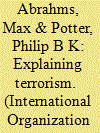| Srl | Item |
| 1 |
ID:
139798


|
|
|
|
|
| Summary/Abstract |
Certain types of militant groups—those suffering from leadership deficits—are more likely to attack civilians. Their leadership deficits exacerbate the principal-agent problem between leaders and foot soldiers, who have stronger incentives to harm civilians. We establish the validity of this proposition with a tripartite research strategy that balances generalizability and identification. First, we demonstrate in a sample of militant organizations operating in the Middle East and North Africa that those lacking centralized leadership are prone to targeting civilians. Second, we show that when the leaderships of militant groups are degraded from drone strikes in the Afghanistan-Pakistan tribal regions, the selectivity of organizational violence plummets. Third, we elucidate the mechanism with a detailed case study of the al-Aqsa Martyrs Brigade, a Palestinian group that turned to terrorism during the Second Intifada because pressure on leadership allowed low-level members to act on their preexisting incentives to attack civilians. These findings indicate that a lack of principal control is an important, underappreciated cause of militant group violence against civilians.
|
|
|
|
|
|
|
|
|
|
|
|
|
|
|
|
| 2 |
ID:
140171


|
|
|
|
|
| Summary/Abstract |
As a key element of their strategy, recent Presidential campaigns have recruited thousands of workers to engage in direct voter contact. We conceive of this strategy as a principal-agent problem. Workers engaged in direct contact are intermediaries between candidates and voters, but they may be ill-suited to convey messages to general-election audiences. By analyzing a survey of workers fielded in partnership with the 2012 Obama campaign, we show that in the context of the campaign widely considered most adept at direct contact, individuals who were interacting with swing voters on the campaign’s behalf were demographically unrepresentative, ideologically extreme, cared about atypical issues, and misunderstood the voters’ priorities. We find little evidence that the campaign was able to use strategies of agent control to mitigate its principal-agent problem. We question whether individuals typically willing to be volunteer surrogates are productive agents for a strategic campaign.
|
|
|
|
|
|
|
|
|
|
|
|
|
|
|
|